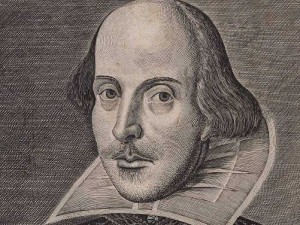When I read Shakespeare in high school, I felt… completely lost. I actually skipped school one day; not to get out of doing what I was supposed to do, but to get some work done! I figured if I could just stay home for a day I would finally have the time to figure it out. Did I? Well, yes and no. Yes, in the sense that I figured out the plot, looked up enough of the words that I could understand some of the meaning, and remembered enough that I could pass a test. But No, in the sense that I never did figure out why we were reading Shakespeare. I didn’t understand why on earth we were reading something that was so hard to follow. Why couldn’t it just be translated into modern English? I now have a modern translation in fact. Why not just assign that instead?
Monthly Archives: December 2014
Reading Shakespeare’s Grammar
I ate the sandwich.
I the sandwich ate.
Ate the sandwich I.
Ate I the sandwich.
The sandwich I ate.
The sandwich ate I.
In modern English, the most common sentence pattern is subject (S), verb (V), object (O), or I (S) ate (V) the sandwich (O). But as this example shows, most common does not mean only possible, and while some of these constructions (“Ate the sandwich I”) are pretty unusual, they are nonetheless grammatically correct.
Unusual word order in a sentence is called inversion. Shakespeare used inversion to create specific dramatic and poetic effects. Inversion can be used to emphasize key words, to create specific poetic rhythms, to give a character a specific speech pattern (think Polonius, for example), or for a variety of other purposes.
Experienced readers “re-order” the words to understand the sentence. They locate the subject and the verb and “re-write” the sentence for clarity (“Ate the sandwich I” is quickly changed to “I ate the sandwich”).
Problems with Speed and Meaning
Actors who are good at memorizing often speed through the words because it’s so effortless for you to remember. Many actors are trying to remember the words, so they naturally put in the natural pauses; others aren’t, so it’s easy to get the engine revved up and lose the audience.
Read that last paragraph quickly, and you can follow it. Read the following speech from King Lear, and you can’t:
Detested kite, thou liest!
My train are men of choice and rarest parts
That all particulars of duty know
And in the most exact regard support
The worships of their name. O most small fault,
How ugly didst thou in Cordelia show,
Which like an engine wrenched my frame of nature
From the fixed place, drew from my heart all love,
And added to the gall! O Lear, Lear, Lear!
(strikes his head)
Beat at this gate that let thy folly in
And thy dear judgment out!
What to do?
Writing Papers
Why do we write papers in Shakespeare?
- To learn more about Shakespeare’s plays, characters, ideas
- • To develop skills of analyzing his plays
- • To learn to communicate well
What’s a paper? A piece of writing that makes an interesting point. What does this mean you need in order to write a paper? An interesting point or idea! It’s called a thesis, and I’ll give a more complete definition in a minute. If you don’t have one, what happens? No paper, a blank paper, or aimless writing that makes no point. How do you come up with them? Well, you need a system for coming up with them, kind of like a tree that you grow that bears fruit. The system we use, is Response Journals, Class discussions, thinking. The system is that by doing those things, your head will be filled up with ideas to write about. Continue reading Writing Papers
Who Was William Shakespeare?

William Shakespeare was born in 1564 in a little English town called Stratford-Upon-Avon, about 100 miles northwest of London, two days’ hard journey by horseback.
He was born in the 6th year of the reign of Queen Elizabeth the 1st, daughter of Henry VIII, whom you might remember being famous for his 6 wives, and also having broken with Rome and the Catholic church over the issue of his divorces.
Shakespeare was born into an England that was no longer officially Catholic, but it also wasn’t quite Protestant.